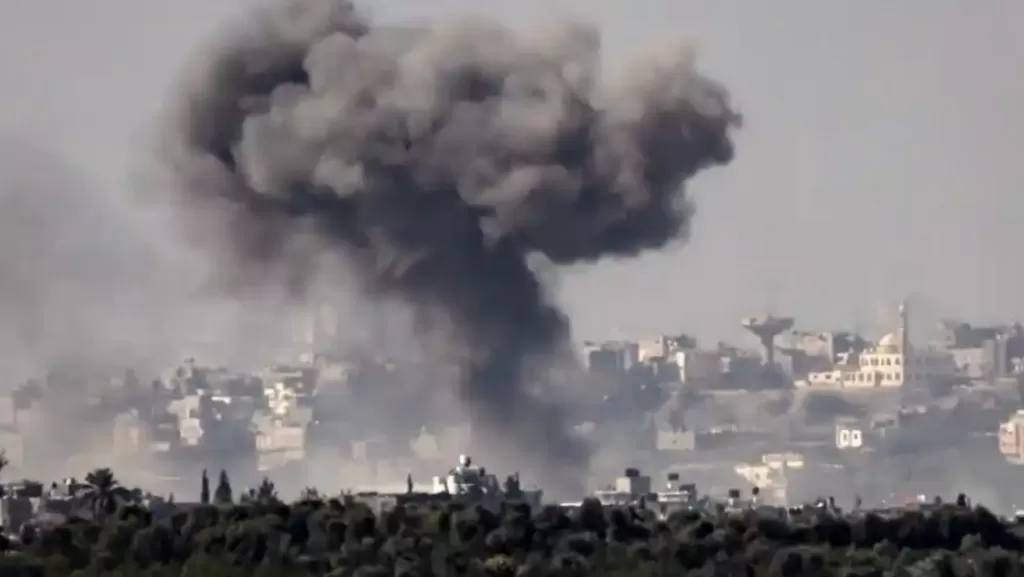Explosions heard in Tel Aviv as Iran launches counterstrikes on Israel

Israel Launches Major Military Strike on Iran: Operation Rising Lion
On June 13, 2025, Israel executed a large-scale military operation against Iran, dubbed “Operation Rising Lion,” targeting key military and nuclear facilities in a dramatic escalation of the long-simmering conflict between the two nations. The operation, announced by Israeli Prime Minister Benjamin Netanyahu, involved precision airstrikes by the Israeli Air Force (IAF) on critical Iranian infrastructure, including the uranium enrichment facility at Natanz, military leadership sites, and other strategic targets in Tehran and Isfahan. The attack has sparked immediate retaliation from Iran, heightened regional tensions, and raised global concerns about the potential for a broader Middle East conflict.
Background: A History of Hostility
The Israel-Iran rivalry, often described as a “shadow war,” has been marked by covert operations, proxy conflicts, and sporadic direct confrontations for decades. Israel views Iran’s nuclear program as an existential threat, particularly given Tehran’s enrichment of uranium to near-weapons-grade levels at facilities like Natanz and Fordo. Iran, meanwhile, has accused Israel of orchestrating assassinations of nuclear scientists and cyberattacks, such as the Stuxnet virus, to sabotage its nuclear ambitions.
Tensions escalated significantly following the October 7, 2023, attack by Hamas on Israel, which killed over 1,200 people and triggered a multi-front conflict involving Iran-backed groups like Hezbollah, the Houthis, and other militias. Iran’s direct attacks on Israel, including a massive missile barrage of nearly 200 ballistic missiles on October 1, 2024, and earlier drone and missile strikes in April 2024, prompted Israel to vow a decisive response. These events, coupled with intelligence suggesting Iran’s nuclear program was advancing rapidly, set the stage for Israel’s boldest military action against Iran to date.
Operation Rising Lion: The Strike
Execution and Targets
“Operation Rising Lion” was launched overnight on June 13, 2025, with Israeli fighter jets conducting precise airstrikes across Iran. The operation, planned for eight months according to Israeli officials, targeted:
- Natanz Uranium Enrichment Facility: Iran’s largest nuclear site, located in Isfahan province, was a primary focus. Israel claims Natanz has been central to Iran’s pursuit of nuclear weapons, a charge Tehran denies, insisting its program is for peaceful purposes.
- Military Leadership Sites: Strikes hit command centers in Tehran, reportedly killing several high-ranking Iranian military officials, though specific identities remain unconfirmed.
- Other Strategic Targets: While details are sparse, reports suggest additional strikes on military infrastructure and possibly the Fordo nuclear facility, though the latter may be a target for future operations.
The Israeli Defense Forces (IDF) emphasized the use of advanced intelligence to guide the strikes, with a video released by Israel’s spy agency purportedly showing the operation’s execution. Sources indicate the attacks caused significant destruction in Tehran, with some describing the impact as “devastating” to Iran’s military and nuclear capabilities.
Israel’s Justification
Prime Minister Netanyahu framed the operation as a necessary defensive measure to protect Israel’s security. In a public statement, he cited Iran’s October 1, 2024, missile attack, which forced millions of Israelis into bomb shelters, as well as ongoing aggression by Iran’s proxies since October 2023. “Iran’s continuous attacks on our people and our homeland demanded a response,” Netanyahu said. “We will not allow a nuclear-armed Iran to threaten our existence.”
Israel also pointed to intelligence suggesting Iran was nearing a nuclear breakout capability, with enriched uranium stockpiles at Natanz and Fordo approaching levels sufficient for a nuclear weapon. The strikes were intended to delay or disrupt these efforts, buying time for diplomatic or further military measures.
Iran’s Response: Retaliation and Rhetoric
Iran swiftly condemned the Israeli strikes, with its Ministry of Foreign Affairs calling them “unjust” and the work of a “criminal and evil regime.” Tehran launched retaliatory ballistic missile strikes on Israel, targeting unspecified locations, though the extent of damage remains unclear. Iranian state media reported that the country’s air defenses were activated to counter Israeli attacks, but the success of these defenses is uncertain.
On social media platforms like X, Iranian users and officials vowed “crushing revenge,” with some calling for escalated attacks on Israeli cities. The loss of military leaders and damage to nuclear infrastructure have likely intensified domestic pressure on Iran’s leadership to respond forcefully, raising fears of a cycle of retaliation.
International Reactions
The international community has reacted with alarm to the escalating conflict:
- United States: The U.S., Israel’s closest ally, repositioned military assets in the Middle East to counter potential Iranian retaliation. U.S. lawmakers appeared divided, with some supporting Israel’s right to self-defense and others warning of a broader regional war. The strikes have also cast doubt on ongoing U.S.-Iran nuclear talks, which aimed to revive the 2015 Joint Comprehensive Plan of Action (JCPOA). Former President Donald Trump, a vocal supporter of Israel, warned Iran of “even more brutal” consequences if it continued attacks, signaling a hardline stance.
- Other Nations: Several countries expressed concern over the strikes, though specific condemnations were not detailed in available sources. The United Nations and other bodies called for restraint to prevent further escalation.
- Regional Actors: Iran’s allies, including Hezbollah and Syria, may be drawn into the conflict, while Gulf states like Saudi Arabia and the UAE, wary of Iran’s influence, are likely monitoring the situation closely.
Strategic Implications
Why Now?
Analysts suggest several factors drove Israel’s decision to strike:
- Nuclear Threat: Israel’s long-standing policy is to prevent Iran from acquiring nuclear weapons at all costs. Recent reports of Iran’s enriched uranium stockpiles and advancements at Natanz likely prompted urgent action.
- Regional Dynamics: The weakening of Iran’s proxies, such as Hezbollah, due to Israeli operations in Lebanon, may have created a strategic window for Israel to target Iran directly.
- U.S. Policy Shift: With the U.S. election cycle and potential changes in administration looming, Israel may have sought to act before shifts in American support or policy.
Consequences for Iran’s Nuclear Program
The strikes on Natanz and other facilities are likely to set back Iran’s nuclear program, though the extent of the damage is still being assessed. Natanz, a heavily fortified underground facility, has been targeted by Israel in the past, including through cyberattacks and sabotage. The loss of key military leaders could also disrupt Iran’s command structure, though its decentralized military system may mitigate this impact.
Risk of Escalation
The tit-for-tat strikes have heightened fears of a broader regional war. Iran’s proxies, particularly Hezbollah, could intensify attacks on Israel from Lebanon or Syria, while Iran itself may escalate missile or drone strikes. The targeting of nuclear sites raises concerns about radioactive fallout, though no confirmed reports of such consequences have emerged.
Casualties and Damage
Specific casualty figures remain limited, but the strikes reportedly killed “many” Iranian military leaders and caused significant destruction in Tehran. The damage to Natanz is likely to delay Iran’s uranium enrichment efforts, though Iran’s leadership has vowed to rebuild and continue its program. The human toll on both sides, including potential civilian casualties from Iran’s retaliatory strikes, is still being evaluated.
Broader Implications
Regional Stability
The Israel-Iran conflict risks destabilizing an already volatile Middle East. A direct war could draw in regional powers, disrupt oil markets, and exacerbate humanitarian crises in neighboring countries like Lebanon and Syria. The involvement of global powers, particularly the U.S. and Russia, could further complicate the situation.
Nuclear Diplomacy
The strikes have likely derailed U.S.-Iran nuclear negotiations, which were already fragile. Iran may double down on its nuclear program in response, potentially accelerating efforts to achieve weapons capability, while Israel’s actions could embolden other nations to take unilateral steps against perceived threats.
Global Impact
The conflict has implications for global energy markets, given Iran’s role as an oil producer and the Middle East’s strategic importance. Rising tensions could also strain U.S. relations with allies skeptical of Israel’s actions, while reinforcing partnerships with Gulf states opposed to Iran’s influence.
Conclusion
Israel’s “Operation Rising Lion” marks a pivotal moment in the Israel-Iran conflict, shifting their shadow war into open confrontation. The precise strikes on Iran’s nuclear and military infrastructure underscore Israel’s determination to counter Tehran’s nuclear ambitions and regional aggression. However, Iran’s vowed retaliation and the potential for escalation threaten to plunge the Middle East into a broader conflict with far-reaching consequences.
As the world watches, the international community faces a critical challenge: preventing a cycle of violence that could destabilize the region and beyond. Diplomatic efforts to de-escalate, potentially through backchannels or renewed nuclear talks, will be crucial in the coming days. For now, the Middle East stands at a crossroads, with the actions of Israel, Iran, and their allies shaping the future of regional and global security.





